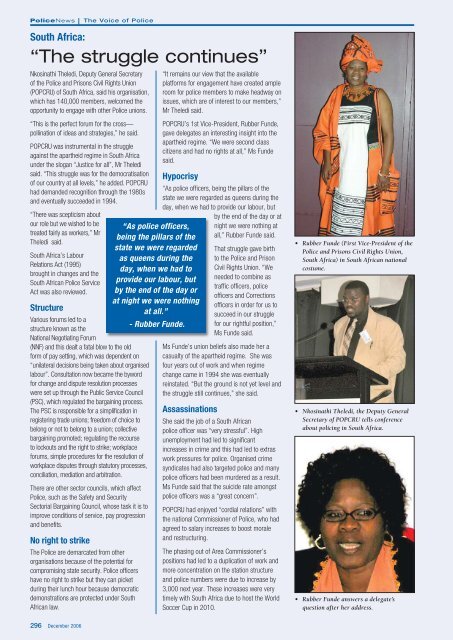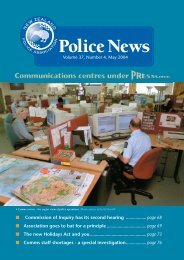Bald On The Beat - New Zealand Police Association
Bald On The Beat - New Zealand Police Association
Bald On The Beat - New Zealand Police Association
Create successful ePaper yourself
Turn your PDF publications into a flip-book with our unique Google optimized e-Paper software.
<strong>Police</strong><strong>New</strong>s<strong>The</strong> Voice of <strong>Police</strong>South Africa:“<strong>The</strong> struggle continues”Nkosinathi <strong>The</strong>ledi, Deputy General Secretaryof the <strong>Police</strong> and Prisons Civil Rights Union(POPCRU) of South Africa, said his organisation,which has 140,000 members, welcomed theopportunity to engage with other <strong>Police</strong> unions.“This is the perfect forum for the cross—pollination of ideas and strategies,” he said.POPCRU was instrumental in the struggleagainst the apartheid regime in South Africaunder the slogan “Justice for all”, Mr <strong>The</strong>ledisaid. “This struggle was for the democratisationof our country at all levels,” he added. POPCRUhad demanded recognition through the 1980sand eventually succeeded in 1994.“<strong>The</strong>re was scepticism aboutour role but we wished to betreated fairly as workers,” Mr<strong>The</strong>ledi said.South Africa’s LabourRelations Act (1995)brought in changes and theSouth African <strong>Police</strong> ServiceAct was also reviewed.StructureVarious forums led to astructure known as theNational Negotiating Forum(NNF) and this dealt a fatal blow to the oldform of pay setting, which was dependent on“unilateral decisions being taken about organisedlabour”. Consultation now became the bywordfor change and dispute resolution processeswere set up through the Public Service Council(PSC), which regulated the bargaining process.<strong>The</strong> PSC is responsible for a simplification inregistering trade unions; freedom of choice tobelong or not to belong to a union; collectivebargaining promoted; regulating the recourseto lockouts and the right to strike; workplaceforums, simple procedures for the resolution ofworkplace disputes through statutory processes,conciliation, mediation and arbitration.<strong>The</strong>re are other sector councils, which affect<strong>Police</strong>, such as the Safety and SecuritySectorial Bargaining Council, whose task it is toimprove conditions of service, pay progressionand benefits.No right to strike<strong>The</strong> <strong>Police</strong> are demarcated from otherorganisations because of the potential forcompromising state security. <strong>Police</strong> officershave no right to strike but they can picketduring their lunch hour because democraticdemonstrations are protected under SouthAfrican law.“It remains our view that the availableplatforms for engagement have created ampleroom for police members to make headway onissues, which are of interest to our members,”Mr <strong>The</strong>ledi said.POPCRU’s 1st Vice-President, Rubber Funde,gave delegates an interesting insight into theapartheid regime. “We were second classcitizens and had no rights at all,” Ms Fundesaid.Hypocrisy“As police officers,being the pillars of thestate we were regardedas queens during theday, when we had toprovide our labour, butby the end of the day orat night we were nothingat all.”- Rubber Funde.“As police officers, being the pillars of thestate we were regarded as queens during theday, when we had to provide our labour, butby the end of the day or atnight we were nothing atall,” Rubber Funde said.That struggle gave birthto the <strong>Police</strong> and PrisonCivil Rights Union. “Weneeded to combine astraffic officers, policeofficers and Correctionsofficers in order for us tosucceed in our strugglefor our rightful position,”Ms Funde said.Ms Funde’s union beliefs also made her acasualty of the apartheid regime. She wasfour years out of work and when regimechange came in 1994 she was eventuallyreinstated. “But the ground is not yet level andthe struggle still continues,” she said.AssassinationsShe said the job of a South Africanpolice officer was “very stressful”. Highunemployment had led to significantincreases in crime and this had led to extraswork pressures for police. Organised crimesyndicates had also targeted police and manypolice officers had been murdered as a result.Ms Funde said that the suicide rate amongstpolice officers was a “great concern”.POPCRU had enjoyed “cordial relations” withthe national Commissioner of <strong>Police</strong>, who hadagreed to salary increases to boost moraleand restructuring.<strong>The</strong> phasing out of Area Commissioner’spositions had led to a duplication of work andmore concentration on the station structureand police numbers were due to increase by3,000 next year. <strong>The</strong>se increases were verytimely with South Africa due to host the WorldSoccer Cup in 2010.• Rubber Funde (First Vice-President of the<strong>Police</strong> and Prisons Civil Rights Union,South Africa) in South African nationalcostume.• Nkosinathi <strong>The</strong>ledi, the Deputy GeneralSecretary of POPCRU tells conferenceabout policing in South Africa.• Rubber Funde answers a delegate’squestion after her address.296December 2006

















